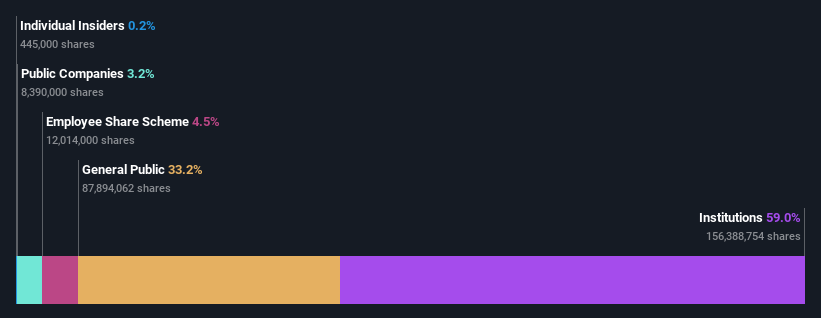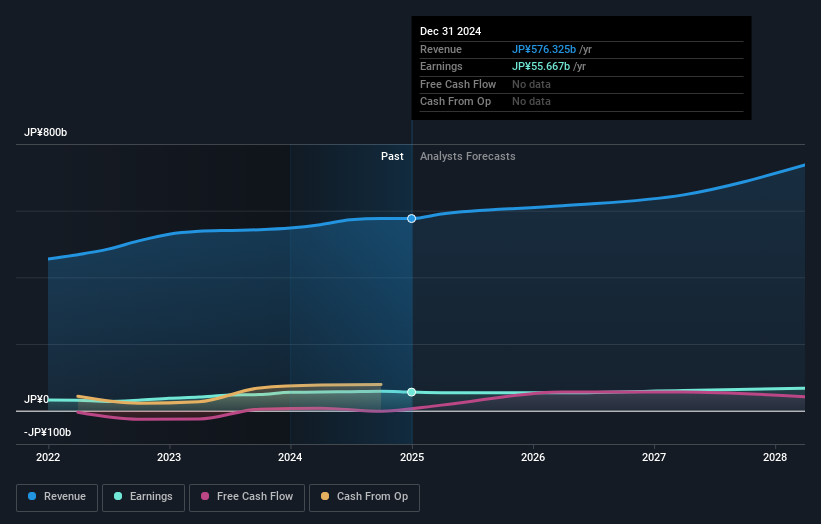Great week for Daicel Corporation (TSE:4202) institutional investors after losing 14% over the previous year

Key Insights
- Institutions' substantial holdings in Daicel implies that they have significant influence over the company's share price
- A total of 12 investors have a majority stake in the company with 50% ownership
- Using data from analyst forecasts alongside ownership research, one can better assess the future performance of a company
A look at the shareholders of Daicel Corporation (TSE:4202) can tell us which group is most powerful. The group holding the most number of shares in the company, around 59% to be precise, is institutions. Put another way, the group faces the maximum upside potential (or downside risk).
Institutional investors would appreciate the 3.4% increase in share price last week, given their one-year losses have totalled a disappointing 14%.
Let's take a closer look to see what the different types of shareholders can tell us about Daicel.
See our latest analysis for Daicel

What Does The Institutional Ownership Tell Us About Daicel?
Many institutions measure their performance against an index that approximates the local market. So they usually pay more attention to companies that are included in major indices.
As you can see, institutional investors have a fair amount of stake in Daicel. This implies the analysts working for those institutions have looked at the stock and they like it. But just like anyone else, they could be wrong. When multiple institutions own a stock, there's always a risk that they are in a 'crowded trade'. When such a trade goes wrong, multiple parties may compete to sell stock fast. This risk is higher in a company without a history of growth. You can see Daicel's historic earnings and revenue below, but keep in mind there's always more to the story.

Institutional investors own over 50% of the company, so together than can probably strongly influence board decisions. Daicel is not owned by hedge funds. Our data shows that Nomura Asset Management Co., Ltd. is the largest shareholder with 9.2% of shares outstanding. Nissay Asset Management Corporation is the second largest shareholder owning 7.7% of common stock, and Sumitomo Mitsui DS Asset Management Company, Limited holds about 5.4% of the company stock.
Looking at the shareholder registry, we can see that 50% of the ownership is controlled by the top 12 shareholders, meaning that no single shareholder has a majority interest in the ownership.
Researching institutional ownership is a good way to gauge and filter a stock's expected performance. The same can be achieved by studying analyst sentiments. There are plenty of analysts covering the stock, so it might be worth seeing what they are forecasting, too.
Insider Ownership Of Daicel
While the precise definition of an insider can be subjective, almost everyone considers board members to be insiders. Management ultimately answers to the board. However, it is not uncommon for managers to be executive board members, especially if they are a founder or the CEO.
Insider ownership is positive when it signals leadership are thinking like the true owners of the company. However, high insider ownership can also give immense power to a small group within the company. This can be negative in some circumstances.
Our information suggests that Daicel Corporation insiders own under 1% of the company. Keep in mind that it's a big company, and the insiders own JP¥536m worth of shares. The absolute value might be more important than the proportional share. It is good to see board members owning shares, but it might be worth checking if those insiders have been buying.
General Public Ownership
The general public, who are usually individual investors, hold a 33% stake in Daicel. This size of ownership, while considerable, may not be enough to change company policy if the decision is not in sync with other large shareholders.
Public Company Ownership
We can see that public companies hold 3.2% of the Daicel shares on issue. This may be a strategic interest and the two companies may have related business interests. It could be that they have de-merged. This holding is probably worth investigating further.
Next Steps:
I find it very interesting to look at who exactly owns a company. But to truly gain insight, we need to consider other information, too. To that end, you should be aware of the 2 warning signs we've spotted with Daicel .
Ultimately the future is most important. You can access this free report on analyst forecasts for the company.
NB: Figures in this article are calculated using data from the last twelve months, which refer to the 12-month period ending on the last date of the month the financial statement is dated. This may not be consistent with full year annual report figures.
If you're looking to trade Daicel, open an account with the lowest-cost platform trusted by professionals, Interactive Brokers.
With clients in over 200 countries and territories, and access to 160 markets, IBKR lets you trade stocks, options, futures, forex, bonds and funds from a single integrated account.
Enjoy no hidden fees, no account minimums, and FX conversion rates as low as 0.03%, far better than what most brokers offer.
Sponsored ContentNew: Manage All Your Stock Portfolios in One Place
We've created the ultimate portfolio companion for stock investors, and it's free.
• Connect an unlimited number of Portfolios and see your total in one currency
• Be alerted to new Warning Signs or Risks via email or mobile
• Track the Fair Value of your stocks
Have feedback on this article? Concerned about the content? Get in touch with us directly. Alternatively, email editorial-team (at) simplywallst.com.
This article by Simply Wall St is general in nature. We provide commentary based on historical data and analyst forecasts only using an unbiased methodology and our articles are not intended to be financial advice. It does not constitute a recommendation to buy or sell any stock, and does not take account of your objectives, or your financial situation. We aim to bring you long-term focused analysis driven by fundamental data. Note that our analysis may not factor in the latest price-sensitive company announcements or qualitative material. Simply Wall St has no position in any stocks mentioned.
About TSE:4202
Daicel
Engages in the materials, medical/healthcare, smart, safety, engineering plastics, and other businesses in Japan, China, and internationally.
Undervalued established dividend payer.
Similar Companies
Market Insights
Community Narratives



